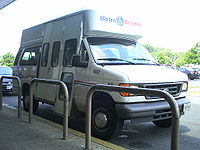- MetroAccess
-
MetroAccess is the ADA complementary paratransit service provided for Washington, D.C. and the Maryland and Virginia suburbs by the Washington Metropolitan Area Transit Authority ("WMATA" or "Metro") for the benefit of people with disabilities who are unable to use Metrobus or Metrorail due to their disability.[1] MetroAccess began operation in May 1994, and since that time, annual ridership has grown from 200,000 to over 2.4 million passengers. The rapid growth of the service is widely recognized as being a result of major improvements and enhancements to the service, the growing population of people with disabilities in the region, and the decreasing number of social programs that offer transportation services to their constituents.
MetroAccess operates 365 days a year, providing door-to-door, shared rides reserved from one to seven days in advance. The base fare, effective July 2010, is US$3.00 per trip (equivalent to twice the base bus fare of $1.50) as long as the trip origin and destination are within 3/4 mile of fixed-route service (a bus stop or rail station). Service beyond this 3/4-mile corridor is now only offered to customers who were grandfathered based on their prior use of "out-of-corridor" in the preceding Metro fiscal year (July 2009 to June 2010). For those customers, supplemental fare charges apply whenever they reserve trips outside the corridor. MetroAccess fares may be paid in cash at the time of service, but customers can also pre-pay for service through Metro's EZ-Pay Program and avoid having to handle cash while traveling. MetroAccess service hours and locations coincide with those of Metro's bus and rail services, with the exception of express routes such as those serving Dulles International Airport. The cost per passenger for MetroAccess is significantly higher than its fixed-route counterparts, and Metro has worked to provide as many opportunities to encourage and facilitate the use of fixed-route transit by its customers with disabilities.
Eligibility for paratransit service is defined in the ADA as being based on an individual's "inability to use public transit" due to a disability, and in some cases, this inability is a result of either accessible services not being offered at the desired time of travel or the absence of an accessible pathway to a nearby bus stop or rail station. Eligibility determinations are made by Metro staff, and for all customers who are found to have an occasional (conditional) ability to use public transit, Metro offers those services free of charge, and this benefit is honored by Metro's jurisdictional partners (i.e., City of Fairfax CUE Bus, City of Falls Church GEORGE bus, D.C. Circulator, Fairfax Connector, Montgomery County Ride On bus, and Prince George's County The Bus). Customers may use these free services on an unlimited basis and without risk of losing their eligibility for MetroAccess.[1] Those who do not have an inability to use public transit but who do have a qualifying disability may be eligible for Metro's reduced (half) fare Disability ID card.
The MetroAccess eligibility determination process requires submittal of an application, part of which must be completed by a qualified medical professional. It has been Metro's practice to provide paratransit service to and from the in-person evaluation at Metro headquarters. Eligible customers are issued a photo ID card that must be presented upon boarding MetroAccess vehicles and that also permits the bearer (and a personal care assistant, if they choose to have one) to ride Metrobus and Metrorail without charge. The photo ID is specifically for the use of the named customer only. Loaning one's MetroAccess photo ID to another person is considered a violation of state laws and will carry the appropriate penalties.[1]
MetroAccess service is provided by a primary contractor-broker with multiple subcontractors and taxicab providers. It is now the sixth largest paratransit service in the United States with a fleet of over 600 vehicles and over 1,000 employees. For more information, visit Metro's web site at www.wmata.com/accessibility.
References
- ^ a b c "MetroAccess Customer Guide". http://www.wmata.com/accessibility/metroaccess_service/customer_guide.cfm. Retrieved 2009-09-11.
Washington Metropolitan Area Transit Authority Services 
Metrorail lines Future projects General managers Jackson Graham • Warren D. Quenstedt • Theodore C. Lutz • Richard S. Page • Carmen E. Turner • William A. Boleyn • David L. Gunn • Lawrence G. Reuter • Robert Polk • Richard A. White • Dan Tangherlini • John B. Catoe Jr. • Richard SarlesRelated articles Transit in Metropolitan Washington, D.C. Agencies Metrorail Commuter Rail Bus Arlington Transit • Connect-a-Ride • CUE Bus • DASH • DC Circulator • Fairfax Connector • GEORGE (suspended) • Loudoun County Commuter Bus • Metrobus (list of routes) • MTA Maryland Commuter Bus • OmniRide • Ride On • Shuttle-UM • TheBus • MetroAccess Paratransit serviceFuture projects Silver Line • Purple Line • Corridor Cities Transitway • DC Streetcar • Pike Transit Initiative • Crystal City - Potomac Yard TransitwayCategories:- Paratransit services in the United States
- Bus transportation in Washington, D.C.
- Bus transportation in Maryland
- Bus transportation in Virginia
Wikimedia Foundation. 2010.


